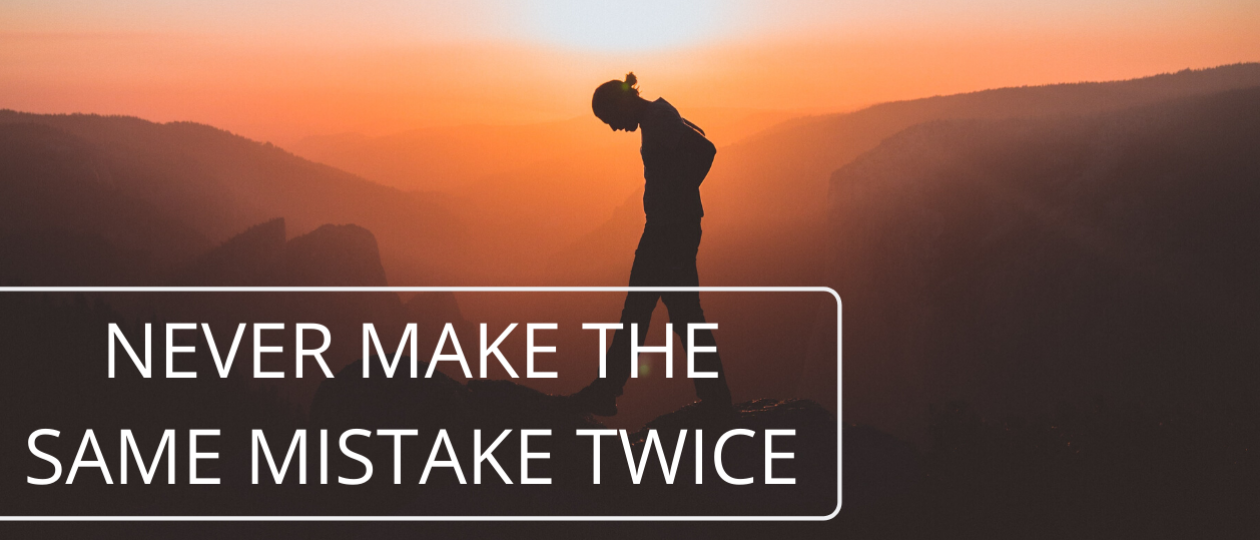Never make the same mistake twice
How many of you wish that you could go back in time and give your younger self a few pieces of advice? I know I do. But on the other hand, the problem for most of us isn’t that we weren’t given good advice, it’s that we didn’t listen to it. The title for today’s spiritual law, “never make the same mistake twice” is something that I’m sure we’ve all heard before. But even though it’s obviously a wise way to live, how many of us can claim to have lived that way? Especially in my younger years, I made the same mistakes endlessly. I knew I was doing it. I wanted nothing more than to stop. But I couldn’t.
That saying seems to assume that once you recognize your mistakes, you should be able to stop yourself. The self-help industry is built on this idea of becoming aware of your problems and then applying your willpower to fix them. But in my experience, that’s usually not how people work. Just because you know you’re doing something wrong doesn’t mean you’re able to stop yourself. I certainly couldn’t, at least not until I found another way of approaching the problem.
So let’s take a moment to discuss the problem. I believe that there is an almost irresistible force inside each one of us that makes us want to do things that we know are a mistake. Modern science has recently begun to show us the shape of this force, too. Our hypothalamus can put us in one of two states: a positive, love-based state, or a negative, fear-based state. It can also leave us in a neutral state. Our life experience is constantly being scanned by the hypothalamus and compared with all the memories of our lives (and we know now that this even extends to generational memories), searching for any triggers that might tell it to put us into one state or the other—and it is especially sensitive to trauma memories.
All this, we’ve talked about in the past. Here’s where the new stuff comes in. When you envision doing something that you believe is wrong, the hypothalamus flips both switches and floods your brain with the chemicals of both states, adrenaline and cortisol from the negative side, and oxytocin, endorphins, and dopamine from the love-based side. This is the only time when your brain does this, and it creates an overwhelming chemical compulsion that is incredibly addictive, almost like heroin.
So if you’re like the vast majority of people, and cannot fight this impulse with willpower alone, where does that leave you? My experience is that the only reliable way to fight that chemical tidal wave is to make a resolution—not to a specific pattern of behavior, but to a relationship. That may seem like an odd statement, but here’s the deal. If you commit to behaving a certain way, you’re forcing yourself into competition against all those brain chemicals, and it’s a contest of willpower that you’re all but sure to lose. So why a relationship? Because love is just about the only thing that can overrule these sorts of pain/pleasure patterns, and love only exists in the context of a relationship.
In the early years of our marriage, Hope and I made some extra money cleaning houses, and my absolute least favorite chore was doing the toilets. I didn’t just dislike it, I dreaded it. But after I realized that I hadn’t really loved Hope and made the transition to attempting to live in real love, I started to catch myself singing as I cleaned them. I’d never even consciously tried to change the way I thought about toilets. That’s the power of making the right kind of commitment.
I'll give you a couple of pieces of caution before I leave you today. The commitment you make doesn't have to be toward a spouse. It can involve God, or your family or friends, even yourself—though it should extend to others as well. But it has to be sincere, and the relationship has to be the center of it, not the behavior you’re trying to change. Remember that you’re trying to get your subconscious on your side, and your subconscious is smart enough to know if you’re just trying to trick it. You have to mean what you say.
Finally, even once you get it right, that doesn’t mean you’ll never mess up. Everyone does. It’s a good day for me when I don’t screw up at least three times. But even when you fail, the context is different. You should be able to feel acceptance and gratitude that you can just move on and try again, instead of beating yourself up for falling short. You’ll certainly do much better than before, but freedom from failure doesn’t really mean that you never fail. It does mean that your failures can no longer hurt you as they did before.
Have a blessed, wonderful day!
Alex Loyd




Add a Comment